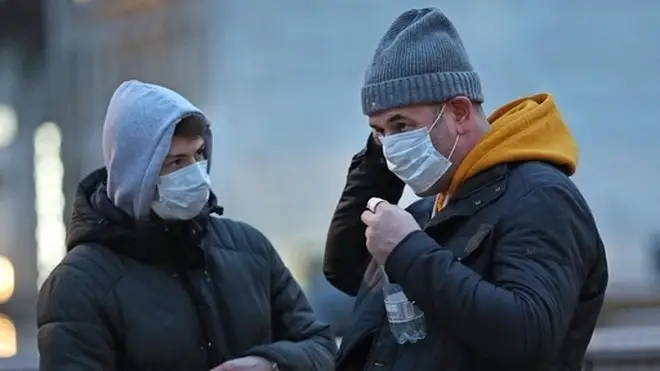
Clive Bull 1am - 4am
26 March 2021, 13:42 | Updated: 26 March 2021, 17:17

The UK's coronavirus reproduction number has risen slightly for the week to between 0.7 and 0.9, according to the latest Government figures.
Last week, the R figure, which represents the average number of people each person with Covid-19 will go on to infect, stood between 0.6 and 0.7.
A coronavirus outbreak can grow exponentially if that figure is above 1, but when it is below it means the epidemic is shrinking.
An R number between 0.7 and 0.9 means that, on average, every 10 people infected will infect between seven and nine other people.
However, the latest growth rate is between minus 5 per cent to minus 2 per cent, which means the number of new infections is shrinking by between 2 per cent and 5 per cent every day.

Nick Ferrari quizzes Robert Jenrick over the Covid vaccine supply
READ MORE: Uptick in Covid infection rates among secondary school children, ONS data shows
On Friday, the Office for National Statistics (ONS) found that when looking into levels of infection among different age groups in England, rates increased among secondary school-aged children (school years 7 to 11) in the week to 20 March.
Rates also fell among older teenagers and young adults (school year 12 to age 34) as well as those aged 50 to 69.
However, the trend is uncertain for other age groups.
The ONS also revealed that around one in 340 people in private households in England had Covid in the week to 20 March - unchanged on the previous week.
It is the lowest figure since the week to 24 September 2020, when the estimate stood at one in 470 people.
The ONS said the percentage of people testing positive "is likely to have levelled off".

Pub 'vaccine passports' could be considered after everyone offer a jab
This comes as a quarter of people in England aged 80 and over are now fully vaccinated against coronavirus, according to new figures.
Data for vaccinations has been published by NHS England, and they have been combined with population estimates from the Office for National Statistics.
Second doses must follow within 12 weeks of the first, meaning more people will need a second jab in the coming weeks.
An estimated 87% of people aged 50 and over in England have now received their first dose of the vaccine.
READ MORE: Tory rebels condemn lockdown law extension that risks 'normalising extreme policy'
MPs recently voted in favour of a six-month extension to the government's coronavirus lockdown legal powers despite fierce criticism from Tory rebels.
The vote to extend the Coronavirus Act passed by 484 to 76, a 408 majority.